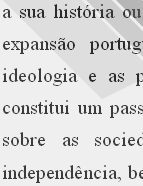

................................
However, it is worth mentioning three Portuguese intellectuals who came from different backgrounds, but whose studies gave rise to new research directions: Ilídio do Amaral and his studies that intertwined the geography and history of colonised spaces, António Carreira who worked on the much manipulated question of the slavery of Africans and Avelino Teixeira da Mota, who, to a certain extent, inaugurated a more autonomous interpretation of the history of the African peoples of Guinea, which he had visited in the 1950s, along with Raymond Mauny, the French historian who, having held a position in the colonial senior staff, went on to revise the colonial historiographical perspectives, much like other Europeans, to value oral sources, take an interest in the history of African peoples, and integrate it into French university teaching.
The end of the European colonial epic allowed for a conceptual and methodological revision, which reflected the growing intellectual awareness of the indispensability of interdisciplinary work, contributing to a 'decolonisation' of knowledge and the autonomous development of the historiographies of the former colonised peoples. Foreign historians, such as the two Englishmen Charles Boxer and David Birmingham, the American Joseph Miller, the Belgian Jan Vansina and the French René Pélissier, who worked on the historical issues of the Portuguese colonisation, met with little response in Portugal, and were censored most of the time. It is a fact that Boxer's work was initially fairly well received by the official entities of the Estado Novo (he was the British representative at the opening of the Congresso Internacional de História dos Descobrimentos in 1960, an academic at the Academia Portuguesa de História [Portuguese Academy of History], and an honorary doctorate by the Universidade de Lisboa [University of Lisbon] in 1953). But a divergence soon emerged after the publication of his book Race Relations... (1963).
Despite a few uncomfortable voices and rare publications denouncing the manipulation of colonial history- such as nuances in the Dicionário da História de Portugal [Dictionary of the History of Portugal] directed by Joel Serrão (1963-1971) and the contributions of Portuguese intellectuals in exile such as Barradas de Carvalho, António José Saraiva, Luís de Matos and above all Alfredo Margarido - Portuguese historiography remained blind to worldwide epistemological changes.
